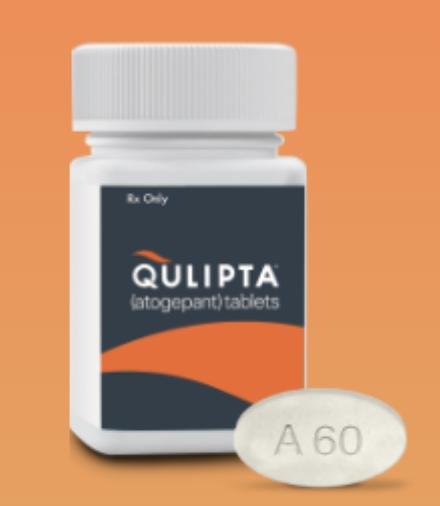Atogepant
Pronunciation: a-TOE-je-pant
Brand name: Qulipta
Dosage form: tablets (10 mg, 30 mg, 60 mg)
Drug class: CGRP inhibitors
What is Atogepant?
Atogepant is a prescription medicine used to help prevent migraine headaches, including episodic and chronic migraines, in adults. Atogepant's brand name is Qulipta by AbbVie Inc., and is a tablet that is taken once a day. Migraines are severe, throbbing headaches that sometimes are accompanied by nausea and sensitivity to sound or light.
Atogepant works by blocking the action of the CGRP protein in the body. CGRP is a protein found in the brain and nervous system that is thought to contribute to the pain, inflammation, and vasodilation associated with migraine attacks. When atogepant blocks CGRP it helps prevent migraine headaches.
Atogepant belongs to a class of medications called calcitonin gene-related peptide receptor (CGRP) antagonists. Atogepant mechanism of action is by directly targeting CGRP to block it from attaching to receptors.
Atogepant (Qulipta) is FDA approved for the preventive treatment of migraine in adults.
Atogepant side effects
Common atogepant side effects may include:
- nausea, constipation;
- feeling tired; or
- weight loss.
Serious atogepant side effects
Get emergency medical help if you have signs of an allergic reaction to atogepant with hives, difficulty breathing, or swelling of your face, lips, tongue, or throat.
This is not a complete list of side effects and others may occur. Call your doctor for medical advice about side effects. You may report side effects to FDA at 1-800-FDA-1088.
Related/similar drugs
Warnings
You should not take atogepant if you are allergic to it or any of the inactive ingredients.
Use only as directed. Tell your doctor if you use other medicines or have other medical conditions or allergies.
Also, see the ‘What other drugs will affect atogepant?’ section below.
Before taking this medicine
To make sure these tablets are safe for you, tell your doctor if you have ever had:
- kidney disease (or if you are on dialysis); or
- liver disease.
This medicine is only FDA-approved for use in adults.
Pregnancy
Tell your healthcare provider if you are pregnant, planning a pregnancy or become pregnant as it is not known if atogepant will harm an unborn baby. In animal studies, atogepant caused pregnancy problems such as low birth weight or birth defects. It is not known if these effects could occur in humans. Ask your doctor about the risk.
Having migraine headaches during pregnancy may increase the risk of dangerously high blood pressure that can lead to medical problems in both mother and baby. The benefit of preventing migraines may outweigh any risk.
Breastfeeding
Tell your healthcare provider if you are planning to breastfeed or are breastfeeding as it is not known if this medicine passes into your breast milk. Talk to your healthcare provider about the best way to feed your baby while taking this medicine.
How should I take atogepant?
Take atrogepant tablets exactly as prescribed by your doctor. Follow all directions on your prescription label and read all medication guides or instruction sheets.
Atogepant tablets may be taken with or without food.
Atogepant dosing information
Usual Adult Dose for Episodic Migraine Prophylaxis:
- 10 mg, 30 mg, or 60 mg orally once a day.
Usual Adult Dose for Chronic Migraine Prophylaxis:
- 60 mg orally once a day.
Dosage Comments
The dose should be modified or avoided when taken with other medications that are:
- strong CYP3A4 inhibitors
- strong, moderate, or weak CYP3A4 inducers
- OATP Inhibitors.
The dose should be modified or avoided in:
- renal impairment
Atogepant is available as 10 mg, 30 mg, and 60 mg tablets.
What happens if I miss a dose?
Take the medicine as soon as you can, but skip the missed dose if it is almost time for your next dose. Do not take two doses at one time.
What happens if I overdose?
Seek emergency medical attention or call the Poison Help line at 1-800-222-1222.
What other drugs will affect Atogepant?
Tell your doctor about all your current medicines. Many drugs can affect atogepant, especially:
- Cyclosporine (Gengraf, Neoral, Sandimmune);
- St. John's wort;
- an antibiotic such as clarithromycin or rifampin (Rifadin, Rimactane);
- antifungal medicine such as itraconazole (Sporanox, Tolsura) or ketoconazole;
- antiviral medicine to treat HIV, such as efavirenz (Sustiva, in Atripla, in Symfi) or etravirine (Intelence); or
- seizure medicine such as carbamazepine (Carbatrol, Equetro, Tegretol, Teril, others) or phenytoin (Dilantin, Phenytek).
Also, tell your doctor what herbal products you are taking, especially St. John's wort.
This list is not complete and many other drugs may affect atogepant. This includes prescription and over-the-counter medicines, vitamins, and herbal products. Not all possible drug interactions are listed here.
Storage
Store between 20°C and 25°C (68°F and 77°F): excursions permitted between 15°C and 30°C (59°F and 86°F) [
Ingredients
Qulipta brand
Active ingredient: atogepant
Inactive ingredients: colloidal silicon dioxide, croscarmellose sodium, mannitol, microcrystalline cellulose, polyvinylpyrrolidone vinyl acetate copolymer, sodium chloride, sodium stearyl fumarate, and vitamin E polyethylene glycol succinate.
Qulipta Manufacturer
Forest Laboratories Ireland Ltd for AbbVie Inc., Dublin, Ireland.
Popular FAQ
Does Qulipta (atogepant) cause hair loss?
No, hair loss is not a reported side effect of Qulipta from clinical trials and is not in the package insert. Reports suggest that alopecia (hair loss) is an emerging side effect with certain CGRP inhibitor migraine medicines, although larger, more adequately controlled studies are needed. Continue reading
More FAQ
References
More about atogepant
- Check interactions
- Compare alternatives
- Reviews (210)
- Side effects
- Dosage information
- During pregnancy
- Drug class: CGRP inhibitors
- Breastfeeding
- En español
Patient resources
Other brands
Professional resources
Other brands
Related treatment guides
Further information
Always consult your healthcare provider to ensure the information displayed on this page applies to your personal circumstances.

